From Greg
I’ve been in email touch with Jeff Nytch for a few years. We have a mutual close friend, and of course a shared interest in teaching entrepreneurship at music schools. Last spring, Jeff invited me to speak at the University of Colorado-Boulder, where he runs the music school’s entrepreneurship program.
But what Jeff writes about here goes beyond any friend-of-friendship, or any speaking engagement. Jeff is not just an entrepreneurship teacher. He’s an entrepreneur, and tells us here how he used entrepreneurship — defined much more deeply than it usually is — to succeed with a new symphony he’s written.
There’s a lot to learn from what Jeff writes, both about what entrepreneurship really is, and how powerfully artists can use it.
“I’ve got a crazy idea but I think you’re gonna love it.”
I had called up my friend Kevin Shuck, Executive Director of the Boulder Philharmonic (one of the two fully professional orchestras in the greater Denver area) and asked him to lunch. It was September, 2012, and just a day after I’d been to a presentation by the Geological Society of America on the geology of Colorado.
My mind hadn’t stopped racing since.
We met at the Cuban sandwich place near us, and after sitting down and exchanging some preparatory chit-chat my friend asked me what was on my mind.
“Last night I went to one of the community seminars at the credit union. It was on the geology of Colorado – did you know I have a degree in geology as well as music?” He didn’t. I went on. “The Geological Society is based here in Boulder, you know – in fact their office is right around the corner from where I live. So of course I had to go to this thing, geek out with the geologists and get answers to some of the geological questions I’ve had since moving out here. And during their introduction they mentioned that 2013 will be their 125th anniversary and they’re doing all sorts of things to celebrate, culminating in their annual meeting in Denver.”
I paused for a moment, and then delivered my punch-line: “So here’s what we’re going to do. The Boulder Phil is going to commission a symphony from me, inspired by the geology of the Rocky Mountains, and we’re going to get the Geological Society to underwrite it to celebrate their anniversary.”
I held my breath, wondering if he would love the idea or think I’d lost my mind.
“Yeah, that’s pretty crazy,” he began. “But you’re right: I love it.”
 Fast forward 12 months, nearly to the day, to the point where the final triumphant chord of the symphony rang through the hall and the audience leapt to its feet. It had been quite an intense year. Never before had a commission of mine fallen into place so easily. Never before had I tackled a project of this scope. And never before had I so publicly shared the journey of creating a piece of music, start to finish. And yet here we were: three curtain calls worth of cheers, and a near-record opening night attendance for the Phil despite a change of date mere weeks before the performance. How did we do it?
Fast forward 12 months, nearly to the day, to the point where the final triumphant chord of the symphony rang through the hall and the audience leapt to its feet. It had been quite an intense year. Never before had a commission of mine fallen into place so easily. Never before had I tackled a project of this scope. And never before had I so publicly shared the journey of creating a piece of music, start to finish. And yet here we were: three curtain calls worth of cheers, and a near-record opening night attendance for the Phil despite a change of date mere weeks before the performance. How did we do it?

The answer lies in some pretty simple principles that have thrived for years in the business community but have only recently begun showing up in the arts: principles of entrepreneurship. I’ve titled this blog “The Entrepreneurial Symphony” because this project perfectly embodies these principles, and because it’s a great example of what I teach students in my capacity as Director of the Entrepreneurship Center for Music at The University of Colorado-Boulder. You see, artists tend to look on their work as something they merely need to convince people to want. The intrinsic value of the art itself is assumed; hence the response I nearly always get when I tell people I run an entrepreneurship program for musicians: “Oh!” they’ll say, their eyes lighting up. “So you teach students how to promote themselves!”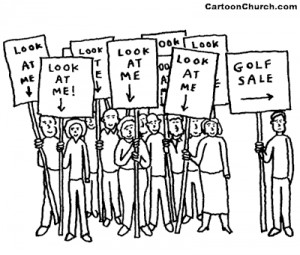
Well, not really. Let’s back up a bit and start at the beginning.
An unmet need
All successful entrepreneurial ventures begin with identifying an unmet need. That need can take an infinite number of forms: it can be an improvement on something already in the marketplace (perhaps the most common instance of entrepreneurism in action) or something completely new. It can be something as mundane as some nifty new household appliance, or something as visionary as recognizing that the public was going to want a way to access the internet when they were away from their computer – a culturally-shifting insight that resulted in the smartphone. Either way, successful entrepreneurship is always built on this fundamental principle: the market will value the product that meets its need.
How does this play out for us artists, though? Let’s begin answering that question by talking about art as a product. This is something that makes a lot of creative folks uncomfortable, as if identifying something as a product demeans it or recategorizes it as merely a utilitarian object. But a product is simply something for which there is a market (i.e., people who are willing to give something in order to have it). And while many  products are merely utilitarian, many others are very special, rare, and costly. Art in all its forms is an incredibly valuable product for which there is a vast and almost infinitely varied market, and that means there is a great deal of potential value locked up in that market. But how do artists unlock that value and bring it to their own work?
products are merely utilitarian, many others are very special, rare, and costly. Art in all its forms is an incredibly valuable product for which there is a vast and almost infinitely varied market, and that means there is a great deal of potential value locked up in that market. But how do artists unlock that value and bring it to their own work?
That brings us to “need.” I think it’s fair to say that human beings have a deeply-embedded need for the things art does for us: moving our emotions, bringing together our expressive and our intellectual sides, transcending our Selves, experiencing cathartic release, and much more. Artists recognize this, but they don’t think past this beginning point. Instead they tend to proceed with the notion that if they simply promote their work to the public this innate need will kick in and people will support them.
The problem is, it doesn’t work that way. And the reason it doesn’t work that way is that the range of artistic products is as broad and diverse as the range of individuals. One person finds emotional experience, transcendence, and catharsis through a Puccini opera, another finds these things through a pop song, a painting, a play, or any number of other things. Further, most people find multiple genres and works that speak to them – but virtually nobody is equally drawn to all genres and styles. In other words, any one work of art is only going to speak to some people, and since whatever it is that connects a work of art to an individual is such an elusive and personal thing, surely you have to do more than merely “promote yourself.” So what else is involved, and how do artists find people who are likely to connect with what they have to offer?
Human needs
For starters, we have to recognize that our experience of art is usually about more than just the work itself. Art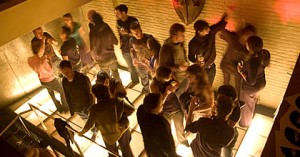 takes place in context, whether that’s the context of a concert hall or museum, or the context of listening to music while working out at the gym. And it’s in this context that a whole host of human needs are met beyond those of the artistic need itself: shared human experience, “high society” visibility, community expression, and yes, even motivation (or distraction) on the treadmill! So if artists wants to create value for their work, they would be wise to begin studying the needs of their target audience, in order to create a context for their art that meets those needs.
takes place in context, whether that’s the context of a concert hall or museum, or the context of listening to music while working out at the gym. And it’s in this context that a whole host of human needs are met beyond those of the artistic need itself: shared human experience, “high society” visibility, community expression, and yes, even motivation (or distraction) on the treadmill! So if artists wants to create value for their work, they would be wise to begin studying the needs of their target audience, in order to create a context for their art that meets those needs.
That might sound terribly abstract, but it’s really quite simple once you think about it. When folks go to a symphony concert, for instance, there are a host of needs getting met beyond the need to hear the music programmed for that evening. In fact, the contents of the program are often the last thing driving consumer decisions about attending a concert: a survey conducted by the Boston Symphony a few years back identified the ease and convenience of parking as the #1 factor determining whether or not someone came to a concert! This is not to say that the music doesn’t matter, or that artistic excellence isn’t important. But in an era when artistic content can be accessed almost anywhere, anytime, we must accept that art doesn’t exist in a vacuum. And for too long artists and arts organizations have acted as if it does.
So what needs were met by my symphony? To begin with, a geologic symphony fit perfectly with the season the Boulder Phil was already planning: a season of works inspired by the natural world. And why should the Phil think that theme would be particularly compelling for the Boulder community? The answer is that they had looked at the sensibilities of their local market and identified Boulder’s love of the outdoors, its close connection to the earth and to its resources, and its appreciation of the stunning geology that shapes the city’s backdrop. A geologic symphony would surely resonate with this community, and the Boulder Phil would be able to advance its mission of programming music that reflected the sensibilities and interests of the city.
And then there’s the Geological Society of America. When we approached them with this idea, they were ecstatic. GSA Foundation President Geoff Feiss said, “This is exactly the sort of thing we’ve been looking for. We’ve been trying to figure out some sort of keystone event to draw our anniversary celebration together; something that could headline our gala at our convention and celebrate our legacy…and not just a speech by some luminary. We wanted something totally outside the box, and this is it!”
Creating value for the audience
So the project would meet the needs of the organizations involved – the Boulder Phil’s season and mission, the Geological Society’s anniversary – and as a result we had the project underwritten inside a month.
With the commission in place we had unlocked value for the Boulder Phil and the GSA, but we still had to create value for our audience. Of course, we would market the concert just like any other – we can’t dismiss the fact that people need to know that something is happening, where to go, and how to buy tickets. But marketing by itself does not create value; it doesn’t even have much of an impact on sales if there isn’t already a connection between the consumer and the product being offered. So before marketing can kick in, you have to create a connection with the audience you hope to reach. In the case of this project, we believed that we could bring people to the Phil who had never come before. But how would we engage them?
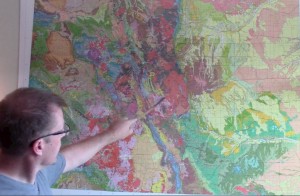 In pondering that question I realized that there were two incredibly valuable assets we needed to put to use with this project. The first was our close proximity to the very geology the music would be depicting. The second was my own unique story: my past as a would-be geologist and how that background would inform the composition of the symphony. I also realized that these assets had to be used in such a way as to demystify both the geology we would be exploring and how I would translate that geology into musical ideas. Only then could we make this project relevant – and thus valuable – to the audience we hoped to reach.
In pondering that question I realized that there were two incredibly valuable assets we needed to put to use with this project. The first was our close proximity to the very geology the music would be depicting. The second was my own unique story: my past as a would-be geologist and how that background would inform the composition of the symphony. I also realized that these assets had to be used in such a way as to demystify both the geology we would be exploring and how I would translate that geology into musical ideas. Only then could we make this project relevant – and thus valuable – to the audience we hoped to reach.
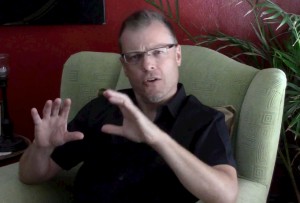 The strategy that resulted was twofold. First I would begin producing a series of video blogs sharing my creative journey. All in all I produced 15 videos about the project, ranging from six to 20 minutes long. Some of these were “virtual field trips” to geologic sites featured in the symphony (here’s the video about the final movement, “Majesties”), while others spoke about musical/artistic issues. Still others spoke about the role of entrepreneurship in this project. Lastly, the videos were promoted by creating short “teasers” for posting on social media. Some used humor and others were more reflective. The teasers would in turn point viewers to my Vimeo channel, where the full videos could be seen.
The strategy that resulted was twofold. First I would begin producing a series of video blogs sharing my creative journey. All in all I produced 15 videos about the project, ranging from six to 20 minutes long. Some of these were “virtual field trips” to geologic sites featured in the symphony (here’s the video about the final movement, “Majesties”), while others spoke about musical/artistic issues. Still others spoke about the role of entrepreneurship in this project. Lastly, the videos were promoted by creating short “teasers” for posting on social media. Some used humor and others were more reflective. The teasers would in turn point viewers to my Vimeo channel, where the full videos could be seen.
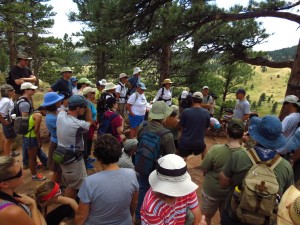 Then, as the date of the premiere approached, we conducted a number of events in the community, including talks about the symphony and guided hikes led by naturalists from Boulder Open Space and Mountain Parks and myself, armed with a portable MP3 player and snippets from the symphony to accompany our hike. The first hike, scheduled a week before the premiere, brought more than 60 people – only a small handful of whom were already Boulder Phil patrons. Many of these individuals had seen my vblogs and had been following me for months; others were on the Boulder OSMP email list and were intrigued. And on the night of the premiere, I saw many of those faces again: the journey from information to engagement was complete. (The second hike, scheduled after the premiere so folks could experience the geology in retrospect, was unfortunately cancelled due to the catastrophic floods that hit Boulder a week after our concert.)
Then, as the date of the premiere approached, we conducted a number of events in the community, including talks about the symphony and guided hikes led by naturalists from Boulder Open Space and Mountain Parks and myself, armed with a portable MP3 player and snippets from the symphony to accompany our hike. The first hike, scheduled a week before the premiere, brought more than 60 people – only a small handful of whom were already Boulder Phil patrons. Many of these individuals had seen my vblogs and had been following me for months; others were on the Boulder OSMP email list and were intrigued. And on the night of the premiere, I saw many of those faces again: the journey from information to engagement was complete. (The second hike, scheduled after the premiere so folks could experience the geology in retrospect, was unfortunately cancelled due to the catastrophic floods that hit Boulder a week after our concert.)
Perhaps the most striking evidence of the success of this approach emerged when, less than a month from Opening Night, the University of Colorado announced that a football game would be taking place the evening of Sept. 7, the date of the premiere. Since the Phil plays in CU’s Macky Auditorium and since a Home football game not only closes the entire campus but paralyzes that entire section of town for hours before and after, the concert was going to have to be rescheduled.
Season brochures had already been sent out; ads had been printed. Schedules had been determined and, in the case of my family and friends coming in for the performance, plane tickets purchased. After assessing the various options, the concert was moved to Sunday night Sept. 8.
When needs get met
September in Boulder is still a time of transition for the locals: many are still spending their weekends hiking and biking in the mountains, while others are settling into the start of a new year on campus. Consequently, opening Night for the Phil has historically been more lightly attended than other concerts during the season. As you can imagine, our worst fear was that this dynamic, in conjunction with the schedule snafu, would result in a weak turnout. We would do our best to spread the news and hope for the best; with only a few weeks left, there was not much else we could do. It was the ultimate test of whether or not our engagement efforts had yielded any fruit.
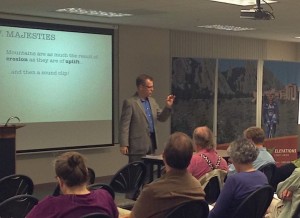 And so it is in this context that I’m particularly proud of the more than 1,500 people who were in Macky Auditorium on opening night, a near-record number for the Boulder Phil’s season opener. The Phil’s patrons had turned out in force, but perhaps more importantly there were geologists, naturalists, and a whole range of other non-regulars who had read about the piece in the press, followed my vblogs on Facebook, or come to a lecture. Their innate need to be moved by art was met once they were in the concert hall, but it was meeting their need to feel a connection to the work that got them there in the first place.
And so it is in this context that I’m particularly proud of the more than 1,500 people who were in Macky Auditorium on opening night, a near-record number for the Boulder Phil’s season opener. The Phil’s patrons had turned out in force, but perhaps more importantly there were geologists, naturalists, and a whole range of other non-regulars who had read about the piece in the press, followed my vblogs on Facebook, or come to a lecture. Their innate need to be moved by art was met once they were in the concert hall, but it was meeting their need to feel a connection to the work that got them there in the first place.
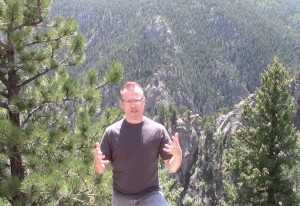 And that’s entrepreneurship at work: when needs get met, value is unlocked. In this case, value was unlocked for the Boulder Philharmonic – a successful season opener and inroads to parts of the community they would not have otherwise reached. And also for the Geological Society – great press (including an interview with me in the prestigious science journal Nature), and an exciting and unique event for their anniversary. And, lest we forget, value was unlocked for me, too, and not just value in terms of my commission fee: I finally got to bring together two great passions of my life in a way I’ve dreamed about for years and write the first of what I hope will be many more symphonies.
And that’s entrepreneurship at work: when needs get met, value is unlocked. In this case, value was unlocked for the Boulder Philharmonic – a successful season opener and inroads to parts of the community they would not have otherwise reached. And also for the Geological Society – great press (including an interview with me in the prestigious science journal Nature), and an exciting and unique event for their anniversary. And, lest we forget, value was unlocked for me, too, and not just value in terms of my commission fee: I finally got to bring together two great passions of my life in a way I’ve dreamed about for years and write the first of what I hope will be many more symphonies.
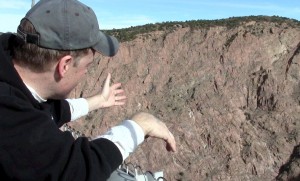
Many artists are uneasy about “this entrepreneurship thing.” They worry that it means having to compromise their art, or that it’s a distraction from the thing they want to be focusing on. But entrepreneurship is never about compromising the very assets that make you valuable in the marketplace. On the contrary! Entrepreneurship is about finding a way to create value for your work so that you can support and sustain the very best you have to offer. It’s also a creative endeavor in and of itself, and when it’s viewed in that light it can be useful in many ways: my field trips and vblogs were not only a lot of fun to put together, they also informed and enriched my creative process, and the symphony was better as a result.
So what’s next? The life of this symphony is only beginning: It will be performed again for the Geological Society of America’s convention in Denver October 29, and three other orchestras here in the west have booked it for 2014. Beyond that, the symphony’s finale features Rocky Mountain National Park – which will be observing its centennial in 2015. And you can bet I’ll be working on a way to make my symphony a part of the celebration.
Jeffrey Nytch enjoys a diverse career as composer, educator, and consultant. He holds dual degrees in geology and music from Franklin & Marshall College and masters and doctoral degrees in composition from Rice University. Previous to his tenure as Director of the Entrepreneurship Center for Music at The University of Colorado-Boulder, he was Executive Director of Pittsburgh New Music Ensemble and maintained a busy freelance career as a composer. In addition to these ongoing pursuits, Nytch has begun a consulting practice in which entrepreneurial principles are applied to strategic planning for arts organizations and other non-profits.

Interesting read, thank you for writing it Jeffrey Nytch and posting it Greg.
I would, however, suggest you re-title it to something that’s more specifically what it’s about
“Marketing a New Symphony.”
90% of this has to do with how to market a new work, not to do with “entrepreneuring a symphony.” Is entrepreneurship, then, just a marketing trick? Marketing is surely part of it, but is there more to being an “entrepereneur” than marketing?
The rhetoric used in this has caused quite the mob in various circles with which I am associated. Mainly because, while Nytch does say (hidden in the middle) about creating art that is the artists style, and not pandering. However, it’s easy to read into this and put in the story that that is exactly what Nytch did.
I do not believe that. After watching a couple videos it’s obvious Nytch cares a great deal about geology, and has a deep resonance with the idea. He just got “lucky,” saw an opportunity to create something he felt was meaningful, and a way to fund it–something difficult to do in modern symphonies.
However, it’s a scary slippery slope as soon as we talk about music as product. If we accept it as a “end,” meaning “I create this music to be a product” it’s very easy to lose the innovation and experimentation. As we’re seeing in concert programming in symphony halls, “butts in the seats” usually equals “stuff people know.” So, if I’m writing a symphony, and I want to sell it, it will not be innovative or experimental, two things which many composers (myself included) think are important for furthering the art form. And it’s why we remember Mozart, Beethoven, Brahms, Wagner, Mahler, etc…they weren’t just the best at what they did, they also brought many new innovations to the table. And it’s why we don’t all remember Hovhaness, Hanson, Salieri, or even Meyerbeer–all people who were mastercraftsmen, who were great “entrepreneurs” in their time, but whose work was well-respected in the time–but it wasn’t innovative or special. It is good music, in that it is highly representative of their times, or certain ideals, but it was either backwards looking or lacked innovation (even if perfectly crafted by the conventions of the time). It’s also why we remember The Beatles and not Chumbawumba. One group did something that was all at once within a mold people knew (Rock) but innovative in many ways (from chord voicings to marketing), and another made a “dance hit” that was indicative of that moments musical atmosphere, sold millions, but faded into obscurity. Or why we remember Radiohead, The Who, The Rolling Stones, or Johnny Cash.
it’s a simple step from Nytch’s arguments to “Here’s a competition, I’m going to scour past winners, see what won, and write a piece derived only from their elements.” Over time, that is harmful to music, leading slowly to a degraded form of art. I do not think Nytch meant this at all, but after several long conversations in which composers thought exactly this (either for or against), I thought I should make the view known.
It comes down to one fundamental dichotomy: “Will this symphony make money?” or “How do I find a way to make this symphony happen?”
Thanks for your comment, John. I direct you to the penultimate paragraph: “Entrepreneurship is about finding a way to create value for your work so that you can support and sustain the very best you have to offer.” The dichotomy you close with is exactly correct, and entrepreneurship is absolutely about the latter: “I have my work — how do I find a way to support it so I can do more of it?” Marketing is certainly part of that process, but it’s only the last step — and marketing will utterly fail if value is not already established for the intended audience. Establishing that value is what entrepreneurship is about, and it’s what I had hoped to communicate in this blog.
While the concerns you raise about compromise/pandering certainly *can* happen, there is nothing about the entrepreneurial approach in itself that makes compromise inevitable. As always, it boils down to the artist’s integrity — something I stress the importance of every day with students and which I hoped would come out in my blog. You are absolutely correct that inauthentic art is never remembered. But I would argue that comparing Salieri to Mozart is a bit of a straw man argument: the reason we don’t remember Salieri’s music (or the others you mention) isn’t because he pandered or thought “too commercially,” it’s because the music simply wasn’t as good! And going another step, the composers you mention — Mozart, Beethoven, etc. (with the possible exception of Mahler) — were all extremely entrepreneurial with their careers: they constantly thought about how best to support their work and were often quite savvy and creative with how they did so (esp. Mozart & Wagner). But that never resulted in 2nd-rate work: we remember them because they were great, irrespective of how they built their careers. So the two issues are separate, and not inexorably connected as you suggest.
Thanks for reading! JN
I wasn’t using a straw-man argument, I was making a point of Salieri being a great example of an entrepreneur whose music wasn’t great…Did he pander? No idea. But he did write music that was not innovative or interesting–good craftsmanship, good career moves, but not great music.
And I agree with everything else. I just wanted to point out what I’ve been hearing. And I really think we need to get away from the arguments about financial value of music–they are dangerous because, as you agreed, what I described “can” happen. And does happen, regularly.
I also think we need to really be looking at some of the historical models of entrepreneurship. It has been happening for as long as their have been musicians–so why don’t we examine how they worked more? The conversations tend to move toward a “this is a brand new phenomena” when it isn’t.
Again, I don’t think many of us artists THINK these things, but it’s not what we’re SAYING.
I think we’re mostly in agreement here. 🙂 Just as Salieri’s entrepreneurship didn’t guarantee him immortality, neither did Mozart’s prevent his (the “Magic Flute,” after all, was about as entrepreneurial an endeavor as one can imagine!). The two are, in my view, completely separate — *except* insofar as I fervently believe that the best way to create value for what you do is to be your best, authentic self. Inauthenticity will almost always fail in the long run. Entrepreneurship is not a magic bullet, nor a substitute for quality. It’s simply a process by which artists who are trying to support their work can do so.
The hairy issue is the term “value.” What is the value of a symphony? Is it the financial gains possible? Is it the “cultural value?” Does this value exist by itself?
And are we limiting our idea of audience? Are we saying “the best marketing advertises to our core subscribers?” or “the best marketing advertises to the wider available audience?” That’s a heavy question that many people have hit on (Drew McManus comes to mind).
There are lots of questions outside the purview of this article that are incredibly important to understanding the business side of music. And I think it’s at least a little important to at least draw attention to that fact, so that the next person that comes by, who may or may not have our backgrounds, will know exactly where this article, and subsequent discussion fit into the wider field.
It’s something else that seems to be missing in lots of business writing–the style is that “do this and succeed,” without addressing where it fits into the wide scheme of things. I just hope, by using these comments, we can help elucidate that this was mostly a case-study, a particular set of events that show a unique and interesting path, from seeing an opportunity to share a mutual interest, to a strong marketing plan that makes the entire process very personal, to a finished product that is most definitely “Jeffrey Nytch” and not a long form jingle.
But it’s easy, especially when we start talking about “products” and “consumers” and “metrics” to lose sight of all the human elements, as well as the place of the discussion within the wider discussion. I offer nothing more than a caution that how we say things is as important (or possibly more so) than what we are saying…Just like a piece written with poor technical skills will not be able to get the point across.
I’ve run out of “Reply” buttons, but I wanted to round out this thread by agreeing with these points, John.
~ Value has many different components, and it may not always be monetary. In fact, I would argue that in this particular example most of the value is non-monetary: the way it enhanced the Boulder Phil’s season, the way it capped off the GSA’s celebration, the opportunity for me to do a project I’d dreamed about for a long time, the audience making a unique personal connection between a symphonic work & their community.
~ I think the question of audience is going to change with each project; in fact, that’s the cool thing about teaching entrepreneurial principles: they play out differently each time….
~ …and therefore it’s definitely not about giving a cookbook recipe and saying “These are the steps you follow for success.” One of the things I love about talking to entrepreneurs is that they freely admit their failed ventures — and quickly follow that up with the lessons they learned. Entrepreneurship is simply a set of principles one can employ to unlock value for their work and help them more effectively reach the audience they seek. It’s much more than marketing, because the process begins long before marketing of the product kicks in. But in the end it’s still a process, a mindset, and not a proscriptive “magic bullet.”
Thanks for a great discussion!
One thing–did Salieri’s or Mozart’s entrepreneurship guarantee a successful livable wage though? This might not be the most useful comparison since Mozart is by all rights a musical genius and likely his work would have survived the time even if he were a terrible entrepreneur which might not be too far from the truth. But how much of the entrepreneurial success for success for Salieri (and the more moderate entrepreneurial success of Mozart) can be attributed to the economic environment they lived in rather than just their skills seems to be a pertinent question and I think that’s what John means with this:
John, I think success is a balance of all these goals, artistic and marketing. Just like a symphony by Brahms, Mozart, etc. is a balance of inevitability with surprise. To hold a single viewpoint that art must never compromise for the sake of its audience (market), is cutting off your own ear. If your product (symphony programs in this case) is too difficult for your market to use, you create a FREE, easy introductory product which will inspire some to upgrade (purchase) and create positive demand (word of mouth). Innovative and experimental music is fine. We must also create compelling and comforting entry ways into the more advanced art. There are two sides to this coin.
I actually disagree with the idea of compromising your viewpoint for the audience (market). First, we really need to get away from the capitalist idea of music in general. By focusing a product to a market rather than creating a market, we’re thinking backwards. Was their a market for iPhones before there were iPhones? Perhaps, in a broad sense (as there were smartphones already, and even touch screen devices dating to the early 90s–but none of them took off or were known…).
And what symphony concert is too difficult for the audience? I think we also need to stop this line of thinking–we treat the audience like they aren’t prepared for new ideas, that the only good route is a safe route. Maybe if we stopped thinking of what the audience may want, and instead presented them with new ideas that they may or may not want, we’d see another path.
I’d argue that a conservative line of programming is a slow death, as compared to innovative programming which can either be a fast death, or a great boon. But maybe we should present the possibility instead of making the choice for the audience?
Your conclusion brings us back to my point. Choices of programming have to be made. If you poll your potential audience (“present the possibility”) in order to program, you’ll be compromising in all directions anyway. And if consumers (“ticket-buyers” if you prefer) can choose between new music, standard rep programs, or a mix of both, then let’s give them many options and label them clearly. People can choose between compromising artists or uncompromising ones. That will offend some but as long as they can find what they want, they have no right to complain. I want my own compromises to interest a new audience to enjoy advanced institutions, whether new music or repertoire.
There is nothing new here -just the same old same old tune-choices in programming
have been made for well over a hundred years ,which now means that the same
hundred or so works deemed “great ” are recycled over and over with the occasional
“new ” work thrown in to prove to the world the institution is alive and functioning .
Conductors are busy acquiring orchestral positions pretending to serve music(some have 3 bases)while it is only about making money .Repackaging won’t do it. Neither
does throwing in a “jazz ” beat here and there do much in furthering the cause of
filling seats . What is needed is a symphony audience that wants to hear the new and different -fat chance of that -and recycling the same old same old under different
labels won’t do it .What is missing in the “classical music ” audience is the life pulse of the art world crowd and no matter how you dress the classical corpse it is still dead .
Congratulations to Jeffrey Nytch on the premiere of his symphony. This is a very interesting account of the whole process.
John, in response to your comment, I can certainly see where you are coming from with regard to entrepreneurship and the possibility that too much emphasis on marketing alone can turn into a long-term problem for the music field. But I would like to offer the point of view that entrepreneurship is not just about marketing; it really is about creating value for your customers (or audience, in the case of the arts) and connecting people to that art. In this case, that seems to be what Jeff did.
Moreover, I don’t know if it’s accurate to say that Jeff got “lucky” in this case. He recognized that there was an opportunity to combine two things that he loves. On some level, he was open to new possibilities and this struck him as a chance to create something new. Whether the inspiration was artistic or entrepreneurial, the result was a new composition that seemed to have an impact on the Boulder community, and isn’t having an impact part of what musicians try to do? Additionally, his ability to fund the project came about through the use of his network–something that I’m sure he has cultivated well over time.
I agree that calling music (or any other form of art) a “product” is something to be careful about. The nature of it is so different than something you can buy in a store, and yet it is still important to make sure that what someone writes is heard. I am all for innovation in music–that is what keeps things moving forward and interesting–and I do believe that when talking about entrepreneurship in the arts, the first ingredient should always be to make sure you have something to say, artistically speaking. But the greatest musical innovations won’t matter at all if nobody is given the opportunity to hear them.
I teach a class in arts entrepreneurship myself, so I may be a little biased with regard to the subject, but I have thought a lot about these issues, and from my point of view, whether you believe that the arts are in crisis or not, in this day and age, it is important for artists and musicians to know how to reach (and connect with) their audiences. The overwhelming amount of choices available to people means that the producers of the art need to be innovative both with their art and they way they put it out there.
Perhaps the symphony described above will not have the historical success of the symphonies of Beethoven or Mahler, but it does appear to have had a positive effect on the audience Nytch was trying to reach, and shouldn’t that count for something as well? Isn’t it possible that, for the residents of Boulder who may not be big fans of classical music but attended this concert, this piece will have more of a lasting impact on them than a Beethoven symphony would?
Again, there’s a confusion between the music and the marketing. As I said, and Jeffrey responded, I think he came from a genuine place to create a great piece of art. The “luck” comes from a right place at the right time–he had the tools in place, the wherewithal to make the moves, start the conversations, and do amazing work. But, the first bit was a stroke of luck–if he hadn’t shown up that night to hear the talk, would this have even happened? Perhaps…But the idea of luck isn’t meant to demean the huge amount of work put into the idea.
There is something that concerns me in this–the idea that a new work, innovative, possibly daring and experimental, won’t reside with a group. This is a conservative thought that worries me, as an artist. But, that’s the trick of marketing, outreach, and other avenues of entrepreneurship.
I truly believe most people are open to new ideas, especially if they’re already active in the art world. And it is up to the artist to present their ideas in a way that not only doesn’t alienate the audience (which can and does happen in new music, at times), but also to help the audience enter the world of the music.
But if we don’t offer the opportunities for this music, and take a conservative line, particularly pulling back on ideas because “the audience may not be ready,” we’ll slowly move away from creating challenging new works, and accept a more “middle road” to make sure we have the money.
This isn’t an argument to stop having orchestras perform masterworks. This isn’t an “us against them” new music vs. old music. This is about a philosophical approach to creating art, one that doesn’t dismiss experimental practices just for the sake of writing what an audience MAY want.
I’m not sure that “butts in the seat” necessarily means “stuff people know” and “not being innovative”. People liked the Beatles, who brought many butts to the seats while being innovative at the same time. I suspect Mozart and the other masters operated the same way.
I pointed out many did amazing innovative things, and that these ideas were not mutually exclusive.
In fact, innovation, IMO, brings more to the table for exciting an audience. And innovation doesn’t necessarily mean “new works,” but even just new approaches.
There is nothing new in the story Jeffery Nytch presents to us .Musicians from time immemorial
have been involved in entrepreneurship of one type or another .You courted popes ,you cozy
up to princes , bored rich wives , you cozy up to power you do whatever it takes to get your work
before the public .In the vernacular it is to be a hustler , by moving things along to where
you want the outcome to be .Vivaldi ,Bach Mozart Beethoven Chopin … they all “hustled ”
in their fashion in desire to be “recognized ” . It’s the way of life . Poor Mr. Nytch for all
his entrepreneurship had to change a concert date to accommodate people chasing a ball up and down a field. Speaks pages as to the standing of the Boulder Symphony. Looking
forward to hearing the work in NY, Boston , London Munich where it counts .
There were two concerts of the symphony scheduled, one for Friday and one for Saturday. They simply swapped venues to avoid the football crowd, since the Boulder *Philharmonic* performs in Macky Auditorium, on the CU Boulder campus.
Having followed Jeff’s symphonic journey avidly since day one, and having commissioned two previous chamber works from him myself, I can sincerely say that this entrepreneurial symphonic project is a) exactly the sort of model which artists should be attempting to emulate and b) a completely-authentic expression of this composer’s voice and artistic ideals. I applaud Jeff for being on the forefront of not only arts entrepreneurship, but of fantastic new American music. Bravo!
as a young composer who detests the trendy terminology of business and marketing infecting the music we create, i have to disagree with most everything in this post beyond the music itself. to offer perspective from the bottom of the food chain, i offer up this dialogue:
“oh, but master, why must music exist within the academy? is it not something different than research? when ripe, not something quantifiable in words, but in spirit and affect?”
“do you not see? how could a musician support him- or herself were in not for the shelter of the academy?”
“but why, then, should the academy preach the tactics and methods of business, if they may live comfortably practicing their art and challenging their minds with creation?”
“do you not see? the academy can only support so many, the rest must be educated to exist outside of the academy!”
“but master, should we not focus our energy in the academy on achieving the highest level of accomplishment for ourselves as artists? such that we might support those who are the best among us?”
“do you not see? how can we quantify the subjective? how can we ascribe worth to that which has no quantifiability? we must, therefore, say that all things must have value, and other circumstances must dictate who are the chosen few among us to harbor themselves in the ivory tower.”
I’m not sure of your point here…. I’ve been a professional musician for nearly 25 years, and for 20+ of those I was outside the academy, freelancing and figuring out ways to support what I do. I came into the academy, only recently, because I believe that the highest calling of education is to equip students for success in life — whatever path they might choose. Within the music academy, to limit our education to mastering the art and not prepare students for life after school is, to my mind, scandalous at best and perhaps downright unethical. After 20 years of learning the hard way how to support my art in the “real world,” I felt a compulsion to share that knowledge with students and others who were not going to get such instruction from anyone else.
Ironically, the “ivory tower” is not entirely receptive to this idea: the reality check of life outside the academy is, in some ways, threatening to those invested in maintaining the status quo. In my experience, very few within the [arts] academy are “preach[ing] the tactics and methods of business.” Quite the contrary!
My goal is simple: give students a bigger set of tools with which to find success in the world. What they choose to do with them is their choice, but to deprive them of such tools is not something I can abide.
A number of us were just having that discussion after Andrew Watts’ piece What Kind of Stress Do Full-Time Composers Experience? was making the rounds on social media. Given that Jeffrey has spent some time in the musical trenches I think that lends some support for his ideas.
Well , there you have it … ” the highest calling of
education is to equip students for success …and one wonders why much of American
education is in the pits .One gives the students a set of tools to find success but at the same
time does a little two step in case the tools fail in noting”-what they choose to do with them is their choice ” All success in the arts is subjective no matter how accomplished the artist .
Success rests with the audience and all the marketing tools in the world won’t help if there
is a lack of empathy with an audience whether that audience is 10 or 10,000. For some
artists to market themselves as a business project is a grave error as they
cannot but help in adjusting their work to what sells or not depending on market audience .
When a university is viewed as a stepping stone in preparing one for success it becomes in essence a trade school – an employment agency and fails its original mission .
One also wonders how ethical it is if it is, to imply that in the “classical” field of music it
is mainly a matter of marketing that brings one to some form of success .
I think you may be assuming that by “success” I mean the “career/financial/fame” sort of success. I don’t. I look on a “successful life” as one in which a person does something they find fulfilling and can find sufficient support for that thing that their material needs/desires are met. This varies widely from person to person: many are content doing something they love and living on extremely modest means; others aspire to fame or wealth; most fall somewhere in between.
I come from a liberal arts background; I despise the trend in higher education that is driving colleges and universities to simply offer vocational training and not much else. Among the skills I believe are necessary for the kinds of “success” I’m talking about are top-notch writing and verbal communication, critical thinking, creatively joining disparate ideas, collaboration, and a mindset of life-long learning and intellectual growth. The reason why I think entrepreneurship is a useful part of this constellation of skills is that it has no preconceived notion of a desired outcome beyond creating something that fulfills the entrepreneur and is sustainable over the long run. That can take on an infinite number of forms and can serve the user throughout their lifelong journey. It’s equipping without proscribing, and to me that’s the goal of a good education.
Wow, there is so much energy and commentary here, I fear my nugatory contribution may be lost in the “snowball” fight of aesthetics vs. economics.
Yours is a great perspective Jeffrey, I hope we get to hear more of your experiences and ideas, since you’re actually reporting back from the front lines. I attended your talk at the credit union in Boulder. This thread here highlights the non-musical part of the story – creating/identifying a place for your work. But, had others been able to hear your artistic efforts to create the music, there’d be less hand-wringing about marketing or selling out. It’s a great symphony, with its own internal logic completely unrelated to the efforts to get it to an audience; nor does it pander to anyone’s expectations.
I think the conclusions drawn from comparisons such as Mozart and Wagner are remembered, while Hovhaness and Hanson are not, are only partly correct. Mozart, Mahler, and Wagner, et al, are remembered and enjoyed because they sound good; audiences generally do not understand the innovations composers brought. No one remembers Peter Mennin for all his “to-hell with what expectations” integrity. Who reads Finnigan’s Wake outside of a classroom? It’s too easy to look backwards at the winners of history and rationalize their success. We underestimate luck. And Wagner may have been the greatest entrepreneur of them all. Beethoven constantly fussed over making money. Would we really know Mahler if he hadn’t be a superstar conductor himself? The list of unknowns is filled with those who were dying to be innovators. The people who remember Mahler, Mozart, Wagner, Beethoven, etc. for their innovations are other composers and conductors. But who would remember any of them if they didn’t have sponsorship and got their music performed?
Greg, I wonder what other successful composers think about this. When I interviewed Richard Danielpour, he said that he tells his students that today’s music world requires them to be adept in many areas: they must be business people, historians, travel agents, socially adept, and understand the listeners perspective, as well as being talented artists. As long as it comes from their love of music. I wonder what other composers might contribute to this discussion, such as John Corigliano, Eric Whitacre (who signed a contract with a modeling agency and nonetheless writes beautiful music), Anna Pavlova, or James Whitbourn, and so many others.
It’s fascinating to me, and a little depressing, that discussions of ways to connect with audiences and of new ways to present music so often trigger fears.
It seems to me that the main reason we have any great music is that we have always had lots of music being made in lots of ways, most of which became quickly forgotten, much of which pandered or imitated. But people kept experimenting with ways to present music and ways to create it, and though most of those experiments fell flat, a few of them proved fruitful.
The best way to assure that more good music gets made is to jump in and create some music, present some, hear some, encourage some. Find ways to connect the music with listeners. Find ways to afford to do all this. And let other people make what they make and present what they present and find their own ways to afford it. Celebrate those things that move you or excite you. Share what works. Ignore the rest.
I couldn’t agree with you more John. The easiest thing to do is shoot down anyone’s theories about how to draw new audience. If I write simple music, imitate both Dvorak AND gospel calls or explain in concert what’s classical about classical music, I’m going to “insult” people for whom these are not intended. What speaks for itself is when I can surprise curious new listeners with this and other music… if only to get them to drop their guard for a while. With so many ways to make and take music, everyone should be able to find what they want without passing judgment on others.
But judgment (or discernment) also seems to be the name of the game in classical: what determines who and what deserves “respect”, review and resources. If it seems arbitrary at times, it’s often because we aren’t privy to the decision process.
Still, I believe it’s imperative to build potential markets (always plural) and specific products (programs, ensembles, series, recordings, sheet music, and yes, spoken words). In doing so, we must define the BIG product (value) people are buying, which I consider to be INSPIRATION. This makes those specific products the MEDIA.
It’s important to keep experimenting… even in support of both new and traditional products.
As a marketing professional (and musician/artist), I find your viewpoint rather fascinating. I would take it one step further… I believe that art can be divided into two parts – one is personal expression and the other is for public consumption. Sometimes they intersect, sometimes they do not. There’s a difference between a creative soul who pours his or her heart onto a page or canvas and one who is creating for a specific audience.
I deal with designers all the time who get their feelings wrapped up in the work-for-hire projects they do – then they are devastated when a client doesn’t get their “vision”. Vision is for personal expression. When the commercial side comes in, it is time to please others. It’s a harsh reality for those who believe their work is part of them. I may be missing your point to a degree, but I feel like this is another viewpoint to contribute.
http://pianosheetmusiconline.com/
One of the things I want to stress is that I don’t think there is an inherent (i.e. unavoidable) contradiction between “personal expression” and “pleasing others.” In fact many of history’s greatest artists and composers have said that the commissions they enjoy the most are the ones with very specific limits or parameters — because it takes the maximum amount of creativity to create something that meets the conditions of the commission AND provides an avenue for the artist’s highest work. I would tell your disappointed designers that perhaps they should start by paying closer attention to the needs of their client and then look on that as a unique creative challenge that requires their very best effort to meet.
I’m already thinking about the next big piece I want to write. I have an idea for it, and as I work on the musical vision for the piece I’m simultaneously thinking about how to create/find an opportunity to make the piece a reality. So I’m thinking, researching, keeping my eyes open, and thinking some more…so when I see a potential opportunity I can pounce. A big part of entrepreneurial thinking is opportunity recognition, and in my case the goal is to create/find an opportunity to support the work I want to do creatively. So it’s the exact opposite of the supposed “pure art vs. commercial art” dichotomy; it’s simply about finding a way to support and sustain the highest art the artist is capable of.
Thanks for reading!
What Mr. Nytch leaves out in commenting on commissions is far more tell than
the observation he presents us- many of history’s greatest composers in accepting
commissions” wrote what they hoped would please ” not what they knew would please.”
What adjustments made to please the patron was usually of a technical nature,mostly
when overestimating the mastery of instruments by performers . Mozart substituted one aria with another
only when technical demands could not be met and being Mozart the second aria expressed
his thoughts as well as the first .Other composers had a take it or leave it approach , while
many had the do best you can until suitable performers show up .(Berlioz )There is a vast
difference between a craftsman and a” creative artist ” as there is in “pure” & commercial art work .
One aims the work to sell (Hollywood, Broadway ) to the lowest common denominator of
understanding while the other hopes that an audience can rise to understanding the creative work presented .
“The” ” true creative” artist never creates to please but he or she always hopes that what
is created ,pleases .